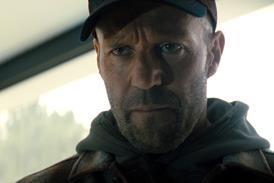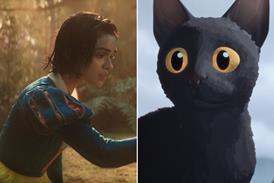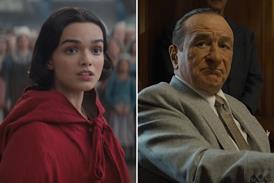Jesse Eisenberg tells Screen why he felt compelled to explore his personal experiences with his second feature as writer/director, mismatched-buddy comedy A Real Pain.

Jesse Eisenberg has a moral dilemma. “There’s something that’s quite strange about, you know, sitting on the subway reading the newspaper about the hurricanes in the south and the wars in the Middle East, and yet what’s actually bothering you is that your subway is two minutes late, and you’re not going to get the muffin that you wanted because you know it sells out by nine.”
A search for perspective lies at the heart of Eisenberg’s second film as writer/director, a mismatched-buddy road-movie comedy centred around a remembrance of the Holocaust and aptly titled A Real Pain.
“We’ve all kind of agreed to these norms,” he says, developing the theme of his muffin and metro story, “that it’s possible to have these feelings while understanding that they’re petty and irrelevant. This is something that’s on my mind all the time. How do we reconcile our own petty grievances against the backdrop of real pain [that exists in the world]?”
A Real Pain concerns two contemporary US cousins, David and Benji (Eisenberg and Kieran Culkin), who sign up for a Jewish history tour in Poland in honour of their recently deceased grandmother. The trip exposes both old wounds and the differences in their personalities: Benji, confident, charismatic, the life and soul of the party, but struggling with mental-health issues; David, stable, settled in his family life, yet envious of his cousin’s ability to tap his emotions.
Comedy was a conscious way of establishing the film’s tone. “Though telling a story about fraught history, I was hoping the movie wouldn’t feel pretentious or sanctimonious,” says Eisenberg, speaking to Screen International in a London hotel bar in the clipped, intense delivery that informs many of his performances. But, unlike those steely turns — think Mark Zuckerberg or Lex Luthor — it is softened by politeness, self-deprecation and a desire to engage.
“My background is in playwriting, and what I’ve tried to do with all my plays is write about things that I’m interested in — immigration and race and sexual politics — but always with a specific character dynamic that can be funny,” he explains. “You can call it a Trojan horse, but it’s also just my taste; I see the world in funny ways, but I’m curious about bigger things and I feel very lucky when I find a story that can have those two things intersect.”
This particular story springs from the director’s exploration of his Polish Jewish roots. David and Benji’s ‘Grandma Dory’ in the film is an amalgam of Eisenberg’s great-aunt Doris, who emigrated to the US in 1938 and died there three years ago, aged 107, and a cousin, Maria, who was the only wartime survivor of those family members who remained in Poland.
Eisenberg met Maria when he visited the country for the first time in 2007, while also checking out Doris’s childhood home — the same house that now features in the film as Grandma Dory’s. “Benji’s story with Grandma Dory is exactly my story with Aunt Doris,” he says. “I showed up stoned to meet her at the Hudson Restaurant on Third Avenue, just like Benji. Even in my thirties, I lived with her during a year-long, weird period of my life. She was the one who always kept me straight. But the survivor stories are referencing my cousin Maria. To streamline the thing, I turned them into one person.”
Creative pathways

As well as personal experience, Eisenberg is becoming adept at feeding on his own creative material. Maria was the subject of his 2013 off-Broadway play The Revisionist, which starred Vanessa Redgrave. Eisenberg was ‘David’ in that play and ‘Ben’ in 2016 production The Spoils, both characters informing those in A Real Pain, while the dynamic between the film’s David and Benji is drawn from one of his short stories.
“I really love directing, and I want to get better at it, so I’m trying to do a movie a year,” he says. “And that means mining things I’ve already written. Luckily, I’ve written so many things that were unpublished, unliked, unseen, that I can do better versions of them now, in my forties, with a more mature perspective.”
Evidence of that is suggested by him winning the Waldo Salt Screenwriting Award at Sundance Film Festival last year for A Real Pain, where the film premiered before getting a US theatrical release in November through Searchlight Pictures. Screenplay nods from the Critics Choice Awards, Independent Spirits and Golden Globes are among the many nominations and wins that have followed.
Eisenberg is also learning as a director. Of his first film, 2022’s When You Finish Saving The World, he says: “I thought it was perfect, it looked exactly like I pictured it, to a frame, but people didn’t embrace it in the way I thought they would have.
“I guess I assumed that audiences are going to be inside my brain and know that every character is suffering through something and deserves their empathy, but that’s just not the case. And so, in this movie, I made sure that there was an explicit sense of what these characters were dealing with.”
His casting of Culkin as the volatile Benji was a bold choice given he had seen none of his co-star’s work beforehand. “You know, I talked to so many people who had worked with him, and everybody just described him as this magical, brilliant sprite.”
In contrast, Eisenberg’s relationship with one of his producers, Fruit Tree’s Emma Stone, goes back to their co-starring in 2009’s Zombieland. “I knew when she was 20 years old that this person was going to run the world. She’s so savvy, so smart, can see both the bigger picture of what a movie needs to be and the detailed nuance of it,” he says of Stone.
Also playing a key role was Polish producer Ewa Puszczynska, whose credits include a very different film about the Holocaust, Oscar winner The Zone Of Interest. “I don’t know that this was exactly her taste, but I completely lucked out,” enthuses Eisenberg. “Everywhere Ewa went they laid down the red carpet for her, because she’s such a respected producer who is known for making movies that are culturally relevant. We couldn’t have done it without her.”
A mostly Polish crew, led by cinematographer Michal Dymek (EO), shot over 26 days across Poland, most notably in the Majdanek concentration camp near Lublin, which is now a Holocaust museum and the major stop for the film’s fictional tour.
Eisenberg’s next project is another example of his magpie borrowing from himself: “I wrote a stage musical 15 years ago and it got close to being produced, and then wasn’t. So my next is a movie about a musical and I’m using some of my old songs.” The untitled film, which will star Julianne Moore and Paul Giamatti, follows a shy woman who is cast in a local musical production; A Real Pain producers Topic Studios and Fruit Tree are back on board.
Is that a little daunting, given his stated love of musical theatre? “Oh no,” he replies. “I’m scared of everything, but I guess I’m most scared of not pushing myself.”

























No comments yet